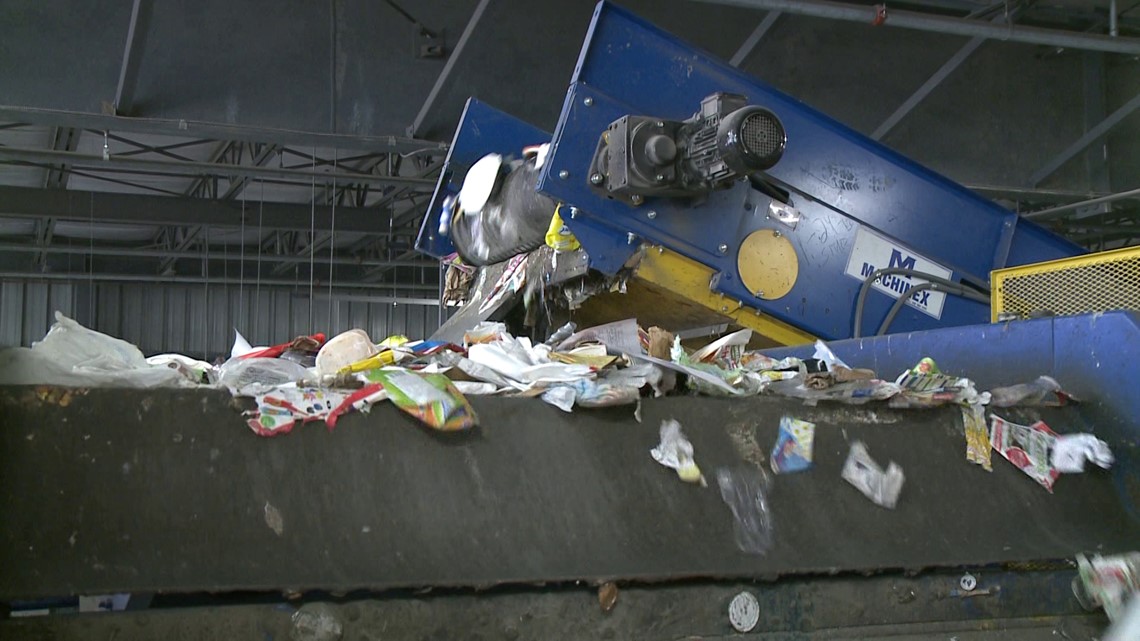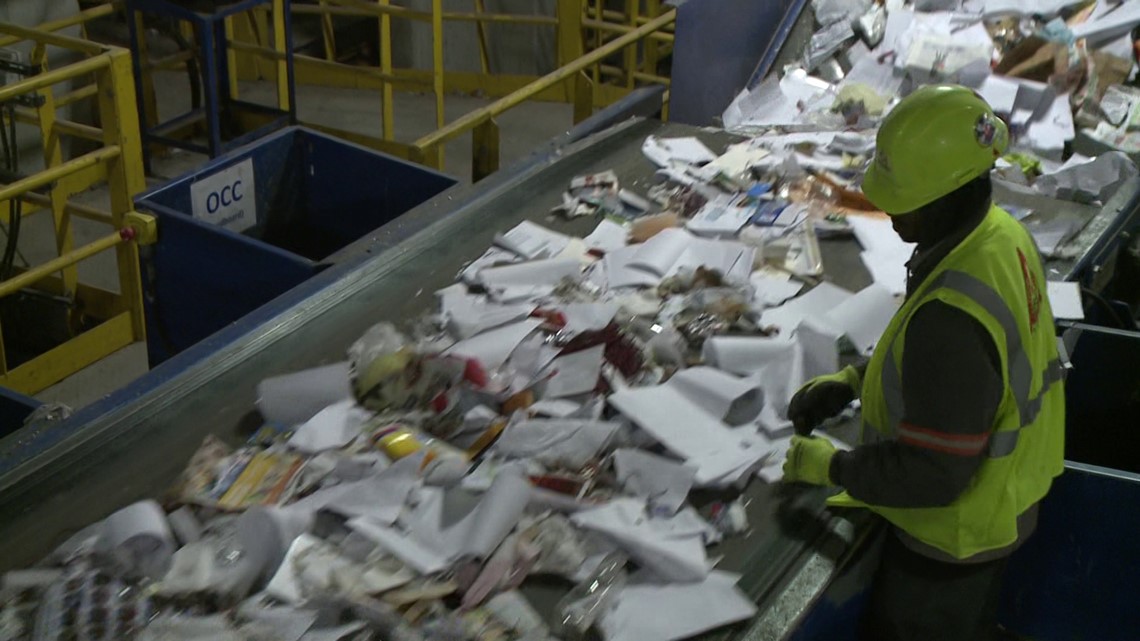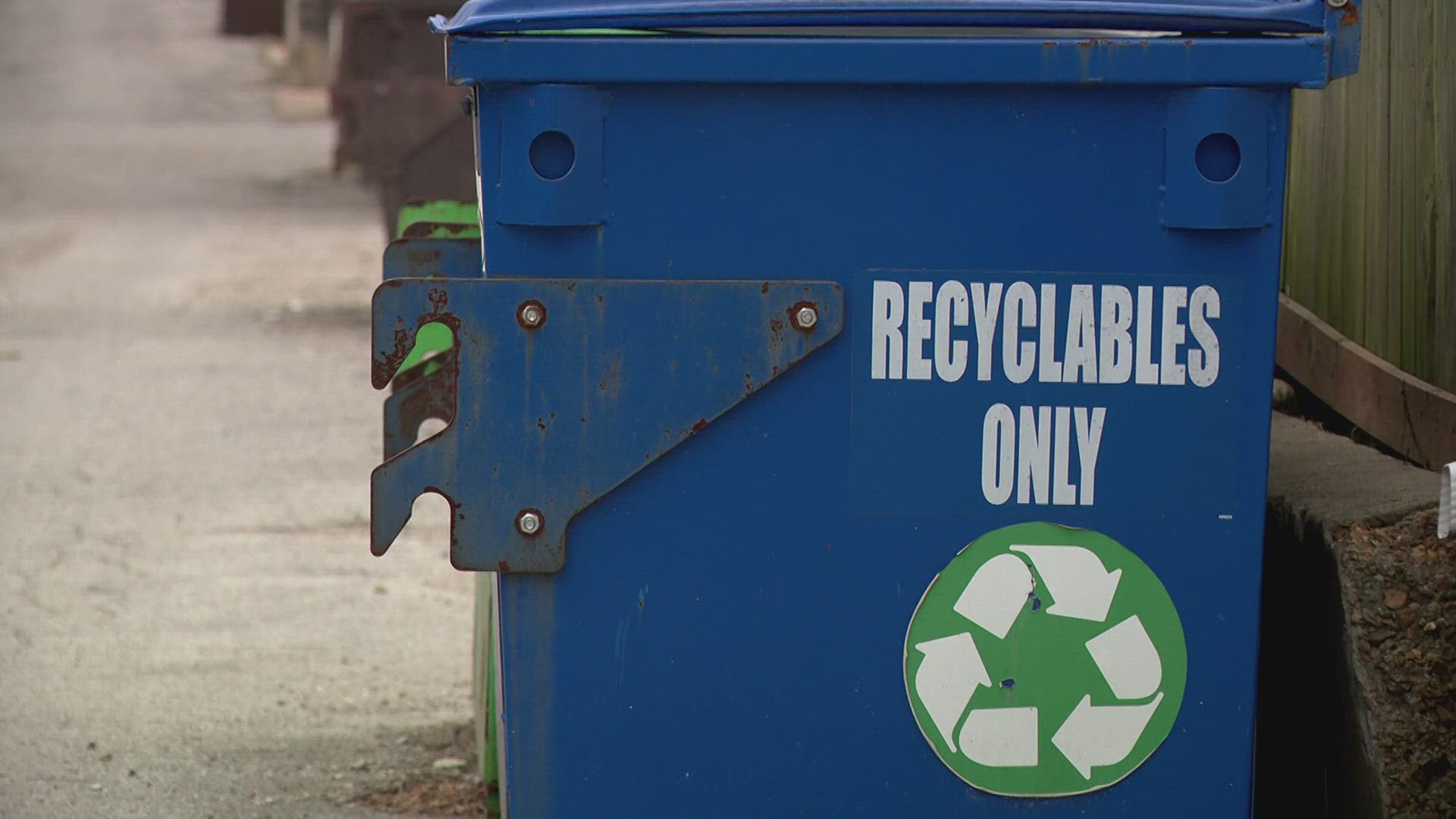ST. LOUIS — For months, St. Louis City resident Michael Maher has captured cell phone footage showing recycling gone wrong from his home in the Shaw neighborhood.
“Frankly, it’s just kind of sad," he said.
His footage showed St. Louis City trash trucks combining trash and recycling, taking everything to the last place the avid recycler wants it to go: overflowing landfills.
“I took the time and effort to separate the trash and recycle," Maher said. “Cleaning out cans, separating cardboard, things like that, and yet, it still wound up in the trash.”
He said he was not the only witness.
“Everybody when I bring this up says, ‘Oh, yeah, I see that happen all the time,'" he said.
So, the I-Team got answers, asking "Is the city recycling?"
“Absolutely," said Randy Breitenfeld, City of St. Louis’ refuse commissioner.
The I-Team brought Breitenfeld Maher's video showing it’s not always the case.
“The only way that should be happening is if the foreman gave him permission to do that," Breitenfeld said.
He said that’s what happened in the cell phone footage Maher captured. To prevent bad recycling from contaminating entire truckloads, certain bins go straight to the trash. Maher is not convinced there was a targeted approach. He believes bins were mixed together indiscriminately for blocks.
The I-Team dug deeper. The city told us that on any given day the contents of around three in 10 recycling bins in alleys actually end up recycled. The rest go into landfills. It’s a reality in line with national rates. According to the U.S. Environmental Protection Agency, the national recycling rate has increased from less than seven percent in 1960 to a rate of 32 percent as of 2018.
Breitenfeld told the I-Team that prior to July 2023, when the city used Waste Management as a vendor, 60 percent of the recycling picked up for sorting from city recycling bins in alleys was contaminated. A total of 40 percent of what was picked up went to Material Recovery Facilities, the final stage in the recycling process. On average about 20 percent of that amount was considered contaminated, with 80 percent being recycled. Right now, the city uses Republic Services, an environmental services provider that includes recycling services, as its vendor. Of the amount of recycled materials that Republic Services picks up from recycling bins in the city, a spokesperson says that on average they are seeing roughly the same breakdown as the previous vendor: 80 percent is recycled and 20 percent are contaminated materials that head to the landfill.
“It only takes a few recycling containers to contaminate a load," Breitenfeld said.


You can avoid some of the most common pitfalls. Here are the top things not to recycle: Plastic bags, Styrofoam, food waste and one-time-use disposables like dirty paper plates.
What you should recycle: paper, flattened cardboard, plastic bottles and containers, glass bottles and jars, metal cans and food and drink cartons.
Turns out it’s a pricey environmental effort. Breitenfeld said recycling costs four times the cost of simply sending trash to the dumpster. When it’s done wrong, he said it means wasted effort and money down the drain.
"Yeah, but the only way that's going to change is, you know, to educate the residents," Breitenfeld said.
The I-Team discovered another challenge: a severe lack of workers. Currently, the city only has four full-time staff inspecting recycling bins. So, Breitenfeld is working to hire more people. He also plans to increase the number of drop-off recycling locations.


“Right now, we have approximately 30 drop-off locations throughout the city. I'm looking to maybe get that up to 50 or double that … Because our drop-off recycling sites are, they get no contamination. People that want to recycle do the right thing. They'll go there usually," he said.
Jeremy Walters, a spokesperson with Republic Services, an environmental services provider that includes waste disposal in the St, Louis metro area, told us in an email: “In the areas serviced by Republic Services, we will always distinctly collect trash and recyclables separately. Recycling plays a pivotal role in helping to reduce our impact on the environment by lessening our use of natural resources. Our recycling center in Hazelwood successfully recovers 80% of the material customers in the region place in their recycling bins. The remaining 20% is trash that should have not been placed in recycling bins to begin with. We encourage our customers to always recycle with intent and never 'wish-cycle' by throwing things in the recycling bin if they are unsure if they can be recycled. Together, our efforts can improve the quality of recycling and help create a more sustainable world now and for future generations.”
A spokesperson with the National Waste and Recycling Association told the I-Team in an email: “There are a few items we urge consumers not to recycle. We do not want lithium-ion batteries in the recycling bin. Lithium-ion batteries are often the cause of fires in our collection vehicles and at our recycling facilities. Other items we discourage are plastic bags from the grocery store, rope, and garden hoses. These items frequently become entangled in our equipment. Items that are commonly accepted for recycling include, paper, plastic, bottles, cans, and glass. We appreciate consumers interest in recycling. We ask them to check locally as recycling policies can vary among neighboring jurisdictions."
Recycling obstacles will not stop Maher from continuing to sort.
“My parents talked about during World War II, recycling toothpaste tubes and things like that. They were part of the effort," he said.
It's an effort he said he still believes is absolutely worth it.
"Big goals are achieved with a lot of little steps that people take, and so, all of us pitching in and doing our part to achieve we can achieve really big goals," he said.
Wherever you live, here’s the takeaway: Keep working to get the right things in those blue bins.
To help increase our recycling rates, Paula wants to answer your recycling questions. Email her your questions directly at pvasan@ksdk.com.

